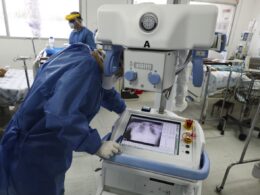Vincent Chin
BCG — Boston Consulting Group
@ Bworldonline
THERE ARE CLOUDS overhead in Southeast Asia, as fresh COVID-19 infections and new variants drive rising cases and lockdowns in countries like the Philippines.
But despite the current challenges, there is welcome light on the horizon as we look beyond the COVID-19 pandemic.
In “The COVID-19 High-Wire Act Continues, But So Too Does Opportunity,” the Boston Consulting Group (BCG) explores the potential revealed through encouraging innovations emerging from a challenging 18 months.
Transformations in science and technology such as our COVID-19 vaccines promise an end to the pandemic.
They also offer the chance to deliver better, fairer healthcare in the world that follows.
Transformation in a post-pandemic world at the time of writing our original white paper, “Detect, Develop, and Deliver: A Holistic Approach to Managing Outbreaks,” in February 2020, global case numbers sat at 78,000, and deaths at 2,500.
Since then, the world has experienced over 4.3 million deaths, and more than 200 million cases.
The unfortunate truth is these figures remain substantial undercounts, particularly in less-developed regions.
In our original paper, we argued the path to tackling COVID-19 was to Detect its spread, Develop healthcare and societal mitigations, and Deliver interventions that helped save lives.
Nations such as Australia, New Zealand, and South Korea showed early on that acting rapidly to tackle COVID-19 was the most effective strategy. But emerging waves driven by more infectious variants reveal how precarious that position can be.
This changing situation can lead to rolling restrictions and an uncertain near-term future.
Much of 2020 was reactionary against COVID-19.
Vaccines now offer us a route to sustained reduction of health impacts that ultimately chart us a path beyond the pandemic.
Resurgent second and third waves in countries such as Thailand, Vietnam, and Japan that had previously done well to suppress the virus reveal the critical part vaccines play in steering beyond COVID-19.
We cannot afford to be complacent about their impacts.
Ensuring equitable global vaccine access will be essential to a sustainable global solution.
The Philippines itself has faced notable hurdles in delivering on this need, with supply chain pressures as vaccines were rapidly procured by more affluent nations.
There are also real logistical challenges in planning a vaccine rollout in a nation which includes heavily populated major metropolitan areas like Manila alongside thousands of individual islands.
The renewed nationwide vaccine drive supported by recently opened 24/7 vaccination hubs is a welcome step on this journey.
COVID-19 and its variants will never truly be eliminated — with vaccine hesitancy and healthcare access challenges — but a global commitment to vaccine provision is vital in managing the threat.
It also paints a powerful picture of how innovations emerging during the pandemic could deliver a better world to follow.
- Digital applications to track exposure to COVID-19 are the most obvious of these tools.
- Alongside them you can include the development of point-of-care diagnostics,
- data-driven analysis of disease outbreaks,
- new treatment modalities,
- and the vaccines which are now working to change the trajectory of this global pandemic.
These innovations did not appear in isolation but were built on existing or emerging technologies.
What they have shown is how with the right policies and resourcing, such ambitions can change the long-term trajectory of global health.
These innovations also built on existing relationships through public-private partnerships, allowing us to implement measures quickly and effectively, revealing how collaboration can drive forward positive societal and health impacts.
Sustainable Transformation is Key
- Radical transformations in the provision of healthcare during COVID-19 offer the potential for persistent positive change in a post-pandemic reality.
While we are rightly focused on funding to ensure appropriate global access to vaccines now, the innovations and infrastructure designed to deliver them could promise greater opportunities for the future — if effectively sustained.
- The current trajectory indicates a significant oversupply of COVID-19 vaccines into next year, offering a chance to pivot manufacturing, supply chains, and administration capacity towards traditional interventions alongside innovative new vaccines for conditions such as cancer.
- Proof-of-concept for mRNA technologies — critical to several key vaccines — also offers a path to innovative treatments for indications from infectious disease to cancer.
- Leveraging an enhanced supply chain with 3D and flexible manufacturing technologies could amplify this opportunity.
- The transition of testing capacity for COVID-19 is another encouraging area.
Now imagine that testing innovation — alongside digital technologies used to track COVID-19 — rolled out to diagnose and track symptoms for infectious diseases, or major conditions such as diabetes or hypertension.
- Elements such as digital telehealth services saw renewed focus during the pandemic, unlocking wider access to healthcare.
Telemedicine provider Medgate reported a 170% increase in consultations after its partnership with the Department of Health during the pandemic, offering a potential positive vision of more accessible healthcare for future. This could be a particularly powerful opportunity for more rural areas of Philippines where access to trained clinicians is a major challenge.
- We also saw an impressive array of additional technology-enabled solutions developed in response to the COVID-19 pandemic.
These include artificial intelligence technologies and platforms with functionality to provide AI-enabled COVID-19 symptom screening and information sharing.
These are just some of the remarkable innovations that hint at the potential for optimized healthcare provision for tomorrow.
- Leveraging non-traditional frontline healthcare workers to deliver an expanding range of services, as we’ve seen with mass vaccination, also offers significant potential, particularly in less-developed countries with reduced access to traditional healthcare.
In Manila, we’re seeing medical practitioners from doctors and nurses through to dentists and pharmacists employed to deliver 24/7 vaccination rollout.
- Maintaining a spirit of clear communication and collaboration will also be fundamental to delivering on this promise.
Tailored communication that targets specific communities has been an invaluable part of tackling COVID-19 around the world, and one which should be maintained in future. That offers a pathway to better engage and treat conditions from mental health to maternal health.
A resilient future
It’s clear that there is no balancing act which enables countries to successfully navigate a false trade-off between health and the economy. It’s equally clear that vaccines form the foundation to a sustainable solution.
What we also wish to argue is the powerful opportunity we are now presented with — not just to build back to normal healthcare provision, but beyond it.
The innovations adopted to tackle COVID-19 should be sustained and scaled if we are to ensure a more resilient healthcare system that delivers long-term benefits for Philippines and its people.
We undoubtedly face a challenging situation with the infectious Delta variant sweeping across the nation, but innovation offers us a route forward.
Like any journey, we’re likely to face difficult bumps in the road, yet the remarkable power of our COVID-19 vaccines and associated innovations offer a glimmer of hope for a future of global healthcare.
About the author
Vincent Chin is the Managing Director and a Senior Partner Global Leader for BCG’s Public Sector practice.
Originally published at https://www.bworldonline.com on August 15, 2021.












